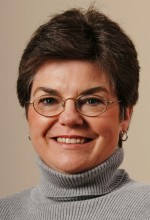The Omaha Film Festival is not exactly the Sundance Film Festival, but I was pleased to see that Movie Maker Magazine places it in the top 25 film festivals worth attending.
So, it was good to go to it with a group of friends to see John O’Keefe’s film “Tokimane.” O’Keefe is a professor of theology at Jesuit-run Creighton University in Omaha. He brings a deeply reflective and spiritual eye to his documentary filmmaking.
“Tokimane” was filmed in Congo. The film’s title is an expression used often by the people there. It means, “We must hold each other,” a thought that should inspire us all during Lent.
O’Keefe is particularly interested in the church in the developing world, and was invited by Bishop Nicolas Djomo to visit his diocese in Congo. Some of his priests have studied at Creighton.
The small town of Tshumbe (pronounced Shoom-bay) is the bishop’s seat, and the film portrays its breathtaking beauty, its extreme poverty and some truly heroic people.
O’Keefe suspects that one reason Bishop Djomo invited him to visit was to encourage a portrayal of “something other than the relentless story of his country’s misery.”
After all, what are the pictures we typically see of Africa, especially Congo? We see starving babies, savage warfare, strange illnesses or deformities. Those things make the sound bites on the evening news or they come in the mail with pleas for donations to a charity.
[hotblock]
The people of Tshumbe are more than the failures of their country, the film tells us. And what are those failures? One of the worst conflicts since World War II took place in Congo. Sometimes called “Africa’s World War,” the five-year conflict ended in 2003 and claimed an estimated 3 million people. All the worst aspects of modern warfare, from rape to displacement of people, descended on the nation.
In light of the country’s history, Tshumbe presents a tranquil appearance. It is a place of gorgeous physical grace, sitting on a vast grass savannah, just south of the world’s second largest rain forest.
In Tshumbe, Sister Rebecca Walo heads up a new university of which Bishop Djomo is quite proud, even though the Universite Notre Dame de Tshumbe has dirt floors and no Internet access. Sister Walo thinks the education of women will be key to the area’s success.
In the film, a young doctor, Antoinette Hakonyange, a serene and beautiful woman who gave up more lucrative work in a large city, has no ultrasound or radiology and diagnoses illnesses with what she admits are “educated guesses.”
She has a device to sterilize medical equipment, but it’s electric and she has no fuel to run it. She sterilizes with steam. She also leads the choir at a weekly Mass, a three-hour event O’Keefe said seemed to pass as a mere moment of presence.
I saw the film twice and met Bishop Djomo, a lovely man, at one of the film’s first screenings in Omaha. The film only got better the second time. The spiritual dimensions of it come home particularly during Lent, when we realize, painfully, how much we have materially compared to so many others, and yet how often the spirituality of the poor can eclipse ours. We have much we could give them, but they have much they could teach us.




The movie Tokimane sounds like a perfect film to show to various groups at the Native American Catholic Church that I attend. Although this is an urban community, there are many who were raised in poor conditions on Reservation lands and would surely identify with the subject matter. There would be much to discuss in a Talking Circle of Elders and youth, as well.
Please tell me how I may obtain a copy of this movie.
Thank you. Maureen